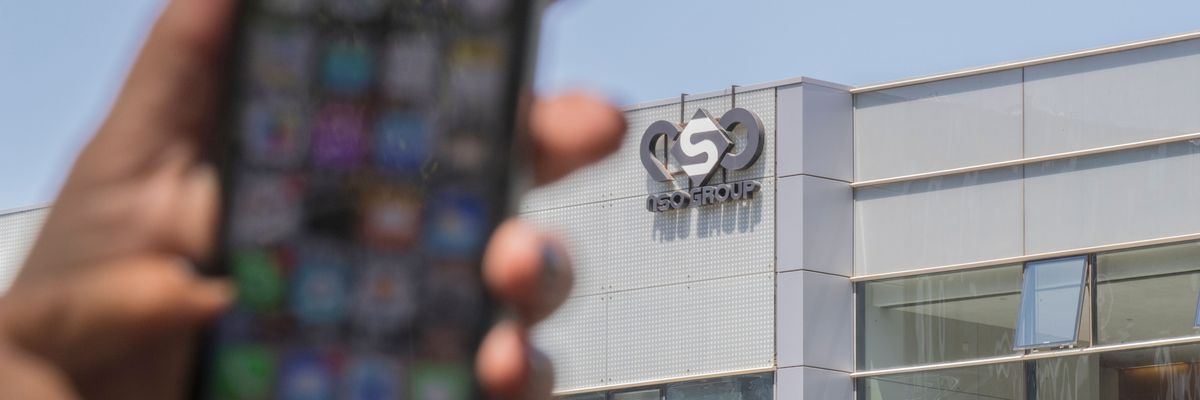"The use of spyware and unlawful targeted surveillance violates the fundamental rights of freedom of expression and access to information, peaceful assembly and association, freedom of movement, and privacy."

A woman uses an iPhone in front of the building of the NSO Group, developer of the spyware Pegasus in Herzliya, Israel.
(Photo: Jack Guez/AFP via Getty Images)
JESSICA CORBETT
May 03, 2023
Six dozen civil society groups, journalists, and experts marked World Press Freedom Day on Wednesday with a joint call for "all governments to implement an immediate moratorium on the export, sale, transfer, servicing, and use of digital surveillance technologies, as well as a ban on abusive commercial spyware technology and its vendors."
The use of spyware against media workers is "an alarming trend impacting freedom of the press and creating a wider chilling effect on civil society and civic space," the statement argues. "Privacy, source protection, and digital security are essential components of press freedom, allowing journalists to protect the confidentiality and integrity of their work and sources."
"As governments and other entities seek to suppress the press and silence dissent, we are seeing an exponential increase in the market for digital surveillance technologies, including spyware, that overrides these journalistic principles."
"As governments and other entities seek to suppress the press and silence dissent, we are seeing an exponential increase in the market for digital surveillance technologies, including spyware, that overrides these journalistic principles," the statement continues. Such tools "can infiltrate a target's phone, giving the attacker full access to emails, messages, contacts, and even the device's microphone and camera," rendering secure and encrypted platforms useless.
"From El Salvador to Mexico, from India to Azerbaijan, from Hungary to Morocco, to Ethiopia—the list goes on of countries where investigative journalists working to expose corruption, power abuses, or human rights violations, have been targeted by invasive spyware such as Pegasus," the statement adds, referencing spyware from the Israeli firm NSO Group that has been used to target reporters, dissidents, and world leaders.
The advocates of banning this type of surveilleance technology noted that there are at least 180 known cases of potentially targeted journalists across 21 countries. They pointed to multiple examples, including Hungary-based Andras Szabo and Szabolcs Panyi being targeted with Pegasus in 2019, and Raymond Mujuni and Canary Mugume facing the same spyware two years later in Uganda.
According to the statement:
Moroccan investigative journalist Omar al-Radi was targeted with Pegasus spyware between 2019 and 2021, and later sentenced to six years in prison on bogus rape and espionage charges. Meanwhile journalist Hicham Mansouri, who fled from Morocco to France in 2016 following state harassment and detention, was hacked by Pegasus at least 20 times between February and April 2021.
Perhaps the most infamous example of how spyware can facilitate and enable transnational repression and serious human rights violations, including enforced disappearance and extrajudicial killing, is the murder of Saudi journalist and dissident Jamal Khashoggi at the Consulate of the Kingdom of Saudi Arabia in Istanbul on October 2, 2018. Both prior to and after his death, Mr. Kashoggi's family members and acquaintances were targeted by Pegasus spyware.
"It is clear that the use of spyware and unlawful targeted surveillance violates the fundamental rights of freedom of expression and access to information, peaceful assembly and association, freedom of movement, and privacy," the statement asserts, demanding not only a ban but also accountability for developers and distributors of the technology, and boosted efforts to protect journalists.
The statement was launched at Secret Surveillance: Countering Spyware's Threats to Freedom of the Press and Expression, an event co-hosted by advocacy organizations including Access Now.
"Invasive and abusive commercial spyware that has been used to facilitate human rights abuses globally has no place in our world," declared Access Now surveillance campaigner Rand Hammoud. "Years worth of evidence by civil society has demonstrated that the companies selling these technologies should not be rewarded with governmental contracts that would continue enabling their abuses."
Natalia Krapiva, tech legal counsel at Access Now, agreed that "this sinister technology that has been misused and abused by governments around the world is not safe in any hands, and its use can never be justified."
"Discussions do not suffice," Krapiva added. "We expect action: Protect freedom of the press, stamp out the spyware threat."
The spyware statement came as other members of the media acknowledged World Press Freedom Day in various ways, including sounding the alarm about the impacts of artificial intelligence on fact-based journalism, demanding global safeguards for digital privacy, and calling out the U.S. government for continuing to seek the extradition of WikiLeaks founder Julian Assange.
Crackdown, disinformation: Report rings the alarm on diminishing global press freedoms • FRANCE 24
No comments:
Post a Comment